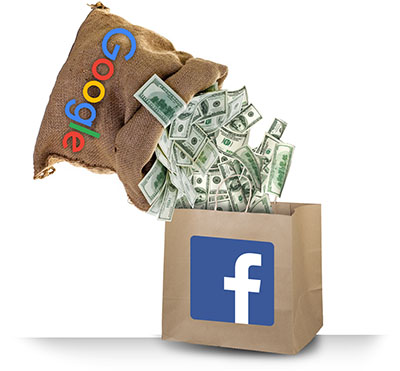
Using our platform consumers can now benefit from a "like" simply for sharing information about their online purchases with their social media friends. The result is Consumer-to-Consumer selling — the stores to unveil this will become visionary leaders in the online marketplace.
When shoppers share info on a product they've purchased and those friends also purchase, they are rewarded... and rewarded again when friends of friends purchase... and AGAIN when friends of friends of friends purchase. This fuels the sales funnel with the holy grail of online advertising: the trusted referral.
We call it "Buddy Buddy Buddy" based on the concept of "three degrees of referrals/rewards".
Just as people can be their own taxi service with Uber... or their own in-keeper with AirBnB, now people can be their own "virtual retailer" and earn valuable rewards for endorsing products they've purchase and in effect "sell" to their friends. C2C!
Here’s how it works:

>>> A shopper we’ll call Adam buys a product from a store referred by a Facebook friend. He posts info of that purchase and about the shopping rewards he earned from the purchase with two clicks at time of checkout.
>>> His friend we’ll call Bill sees the post and buys the same product from the same store. He too earns rewards and Adam, the shopper who referred him, gets more rewards.
>>> Two of Bill’s friends, Carl and Don, also purchase and post. They each get rewards, both Bill and Adam gets more rewards from Carl’s purchase and rewards from Don's purchase.
>>> Two of Carl’s friends, Fred and Gary purchase, and two of Don’s friends, Hank and Izzy purchase. Adam gets more rewards resulting from all purchases; Bill gets rewards from all purchases; Carl and Don get more rewards from all purchases... etc.
>>> Rewards are earned by everyone in the loop when friends, friends of friends, and friends of friends of friends purchase. After three levels, original shopper Adam drops off, but referrals and rewards continue on as long as people continue to purchase from referrals.
This example involves only 9 people. The average Facebook user has about 200 friends. When you work out the potential on three levels of rewards with that many friends, that’s 200 X 200 X 200 which is 8 million! Certainly not every friend would buy, but even a small fraction would deliver a huge bounty of rewards for all shoppers in the loop. And while shoppers drop off after three levels of rewards, as more friends purchase, rewards continue unabated. We call this the "Buddy Train" because shoppers get on by purchasing, and after three levels they get off—but other shoppers take their place. So the Buddy Train keeps running generating more referrals, more sales and more rewards.
The whole system/process is called Buddy Buddy Buddy for the three levels of rewards.
Now, about those rewards. They’re called by Buddy Bucks and they’re portable in the sense that Buddy Bucks earned at the shoe store can be redeemed with purchase at the book store, for example.
Merchants will realize the amazing power of the system and how it will drive sales. They control the value of the rewards through redeem sale management and will see that the greater the discount the more shoppers it will attract. In other words, they can offer "redeem sale items" for a mix of cash and rewards. For example: 50% cash and 50% Buddy Bucks—or even up to 90% Buddy Bucks and 10% cash. It's completely up to the merchant. Why would they do this? Because it will drive sales and each sale starts another chain of referrals and further sales. Also remember: they are no longer paying large sums of money for click ads, so they re-direct that spend to the consumer. Now they are in control—not Google.
And the best part? Instead of shoppers searching Google to buy, they will search Facebook for friends who have purchased the product they are looking for. And when that happens—and it will happen quickly—it’s the death knell for the dreaded pay-per-click ad because with BBB, merchants pay a fee only after a sale is made, whereas with AdWords, they pay Google for each click-through whether a sale is made or not. Add that to the fact that clicks ads are a mere .03% effective, you can readily see why merchants will drop the pay-per-click ad like a hot potato because: Why pay per click when you can pay per sale?
After ads get blocked nearly out of existence in the near future, what's left? How will the web make money? How will the Internet evolve beyond this? One word: Innovation. But the problem is, no one is innovating. It's just more of the same old. More ads... more copying other "that's the way we've always done it" processes. Well, we have something fresh and positive.
LEARN MORE: